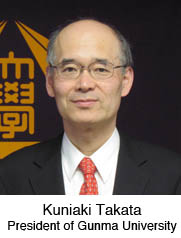
The Global COE (Center of Excellence) Program “Signal Transduction in the Regulatory System and its Disorders” has been run by Gunma University and Akita University. The Japanese Ministry of Education, Culture, Sports, Science and Technology (MEXT) supports this program. Our proposal was successfully approved and funded by MEXT and the program was initiated in 2007. To date, 13 programs have been approved in the field of life science. The aim of the Global COE program, in general, is to establish global centers of excellence in scientific research and higher education, especially for the promotion of young scientists.
Research into thyroid related issues emerged in Gunma prefecture since thyroid disorders and related diseases have been commonly encountered here. Physicians and scientists interested in thyroid issues served as the core members in establishing an active scientific community of hormone research in Gunma. In 1951, the Endocrinology Research Facility affiliated to Gunma University Faculty of Medicine was established. In 1963, it was expanded and renamed the Institute of Endocrinology. It was a unique research institute dedicated solely to hormone research in Japan. To adapt to the rapid development of molecular genetics and cell biology, the Institute was later reformed and renamed the Institute for Molecular and Cellular Regulation in 1994. This Institute is also one of the important facilities of the Graduate School of Medicine. It has served and will continue to serve as a core in research and in graduate education in the fields of endocrinology and metabolism in Gunma University.
In carrying out the 21st Century COE program, the predecessor of the current Global COE program and scientists from the Institute and the Medical School constitute the core members of the program. In addition, researchers in neurobiology have also been included. Since common molecular and cellular mechanisms such as vesicular transport and exocytosis are often encountered in endocrine cells and neuronal cells, this joint community continues to work quite well together. This program has been considered to be highly successful since the time of its completion.
With regard to the proposal of the Global COE program, we have tried to further expand the concept of our successful 21st Century COE program by joining with Akita University. This university had been focusing on immunology and oncology in its successful 21st Century COE program. Since we believe that endocrine, neuronal, and immunological regulation could have common molecular and cellular mechanisms, a common scientific community dedicated to endocrinology, neurobiology, and immunology would have a huge impact in these fields of research. In our Global COE program, we have carried out a number of joint activities such as joint symposia and a joint thesis defense program with graduate students. In fact, this joint venture has been highly successful and highly appreciated in its interim evaluation of the program by the Japan Society for the Promotion of Science (JSPS).
In 2010, the Institute was nominated to be a national cooperative research center in endocrinology and metabolism research. We continue to serve as a nation-wide center in cooperative research.
We will continue to carry out our cutting-edge research activities as well as the education of young researchers in this program. By doing so, we can further strengthen our function as a center of excellence in research and higher education based on our heritage of endocrinology, neuroscience, and metabolism research.